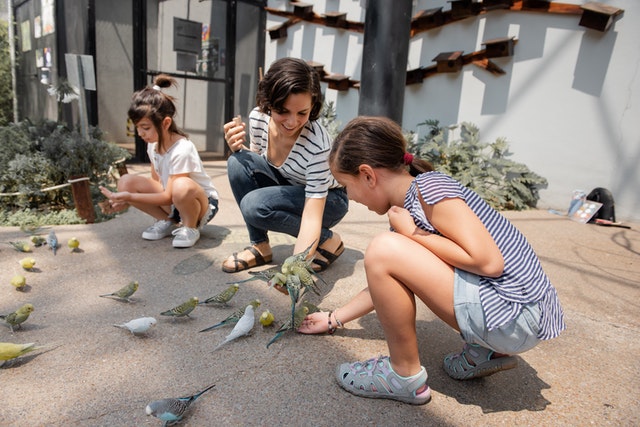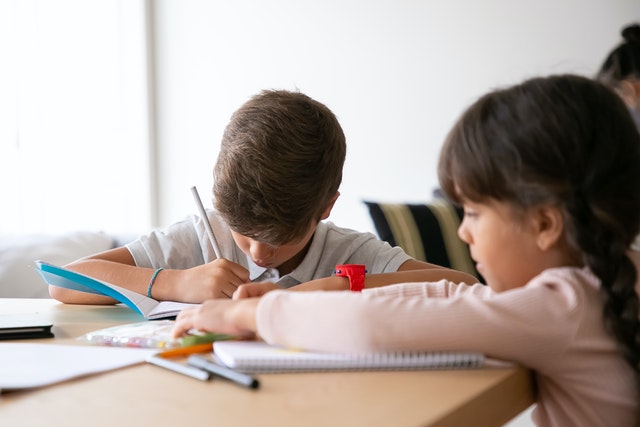Nothing beats teaching at elementary school. Innocent childhood (which goes hand in hand with good discipline in the classes) reigns in the premises, while you help the children learn the very basic, yet essential skills of living in the modern society–reading, writing, counting. You help them discover an entire new world, and can draw endless energy from their playfulness and curiosity. It is indeed wonderful teaching at elementary school, and I know it first hand, because I started my career teaching at a great elementary school in Philadelphia, many many years ago.
But what will happen in an interview for this job? A lot, and not so much at the same time. They will inquire about your motivation, strengths and weaknesses, about your teaching methods, classroom management, future plans, and so on. At the end of the day, however, they care mostly about your personality. As long as they get an impression that you are good around children, that you understand their world, and can be a good role model for them, they will give you a chance. Let’s have a look at seventeen questions you may face, and how to deal with each one.
Why do you want to work as an elementary teacher?
Motivation of job candidates is one of the decisive factors in every interview. Elementary teaching is no exception to the rule. Good salary, clean working environment, or personal challenges, are not really the things the interviewers seek in an answer of an ideal job candidate…
They want to hear that you care for their educational institution, and of course for your students. Talk about your motivation to lead the children, to be a good role model, and to help them learn the most vital skills.
I also suggest you to avoid connecting your job choice to the past, saying that you want to work as a teacher because it was a field of your study. This answer sounds like a must, not a desire. Speak with enthusiasm about your teaching mission, and you will make the best possible start to your interview.
Where do you see yourself in five years from now?
You should not really aim for promotion, because there aren’t many career growth opportunities for elementary teachers. Of course, one can be promoted to an assistant principal position, or head of the department, or even become a principal, but that’s not an easy path to follow, it likely won’t happen in five years from now, and it requires continuous education and effort on your side.
Say that you see yourself having the same job in five years time, but want to become a better teacher, a better person. Another alternative is focusing on your goals in personal life. Perhaps you want to start a family, or learn a certain skill, or become this or that. Any vision of the future that is connected to elementary teaching is a good vision to present in your interviews. You can check sample answers to this question here: Where do you see yourself in five years time?

Can you name main challenges elementary teachers face nowadays?
We live in challenging times. Many youngsters are not interested in their studies, especially in traditional subjects. On the top of that, the boom of social media and smart phones brought new challenges and many distractions to the classroom, including the elementary education. The number of children in a class is increasing, parents have little understanding for the teachers’ opinion, and many children are obese–which is, in my opinion, the gravest problem of all, though everything relates to everything really (children spending all days playing with smartphones and tablets, while their parents do not care, have a high chance of ending up obese and socially isolated). We do not live in an easy time for humanity, let alone for school teachers.
You should name at least couple of challenges, and outline your personal strategy to tackle them. This is one of the differences between good, and exceptional job candidates. Good candidate see only the problems, while the exceptional have some solutions on their mind, or at least an idea of possible solution. Think about it for a while. For example, you can say that you want to promote games and activities that motivate children to move, in order to help fight the pandemic of child obesity…
What are your strengths and weaknesses when it comes to elementary teaching?
Anything you say, focus on your desire to improve, to become a better teacher down the road. If this is your first job application, you can point out lack of experience as your biggest weakness. While you went to school and learned in theory how to address this or that challenge, one cannot really simulate the environment of a typical classroom, and staff-room, and everything that can happen there. You will need some time in the job to learn how to handle these challenges.
For your strengths, I suggest you to pick something highly relevant for the job. Just make sure it corresponds with your interview presence. Communication skills, emotional intelligence, passion for teaching, ability to win the trust of young children, patience, attention to detail–are just some of the strengths you can mention in your elementary teacher job interview.
How would you approach the students of the first class, on the first day at school? What would you say?
First day is a stressful experience for both teachers and children (and sometimes also for the parents). Try to show the people in the hiring committee that you have a plan. The exact words of your speech are not important–and no need to have them ready by now. Your attitude matters. Show them that you approach the first day cautiously, preparing for it in advance, and minimizing a chance of negative surprises.
You should also show empathy and understanding of the situation. Interviewers do not expect to hear an excellent speech, because first class students don’t need to be taken aback by your words. They just need to feel understanding, and sense of friendship, security, and leadership, in a new environment they are just discovering.
What teaching methods do you prefer and why?
Different teaching methods are preferred at various places (think Montessori, Waldorf, and other special concepts of early childhood education and elementary education). If you apply for an elementary teacher job in one of these places, you should learn more about their methodology of work, and refer to it while explaining your teaching methods.
In any other case, try to demonstrate your knowledge of various teaching methods, and emphasize individual approach, and flexibility. You won’t stick with a single method, just because you like it and are good at it, or because it is the most convenient one for you. Oppositely, you will do everything to make the students engaged. And to make it happen you will mix it up, and apply innovative teaching methods such as a flipped classroom or learning by playing. We also have online an in-depth analysis of this question, and you can read it here: What are your favorite teaching methods?
Do you think that all students should be treated equally, or that we should follow an individual approach to everyone, taking into account their capabilities and learning potential?
This is a tricky question, because each teacher and school principal has their opinion on the issue. Some of us believe that children should be treated equally, and their rankings should reflect the differences between them. In every class you should have the best, the average, and the worst students. Not everyone agrees with this approach though.
My personal opinion is that especially at elementary education level, teachers should do their best to motivate weak students to learn, and to enjoy going to school, because it will reflect positively in later stages of their education and life. Therefore I preferred to hire teachers with individual approach to every student (while I was working as a principal and leading interviews).
However, your interviewers can have another opinion. Probably the best answer is a neutral one, saying that you can apply both approaches, and plan to follow the school standards. Do not hesitate to think out loud in your interview. As long as you justify your words, you are good to go.

Imagine that a father of one of your students complained about something which was untrue. How would you react?
Trying to convince an unhappy parent in often an uphill battle, especially if their beloved child lied to them. Anyway, you should tell the interviewers that you would not be offended, and would always try to explain what really happened and why their child overreacted, without arguing with the parents, without losing your calm.
Teachers face some untrue accusations during their career, and the key is to show that you are ready for this aspect of teaching job, and that it won’t affect you negatively. You know it is a part of the job. And you accept it as it is. You will try to maintain your integrity, and do your best in the classes. Some people may not like it and may accuse you of certain things, but it won’t put a dent in your best efforts.
What is your opinion about information technology at elementary school?
Many school leaders believe that pupils should work with computers as often as possible in the classroom, while psychologists and other experts tend to disagree.
On the top of that, they may be asking about utilizing computers to teach, but also about IT classes in the first grades, and computers in the classroom. You should address all of that in your interview answer or you should ask them to clarify the question, so you know exactly what they are inquiring about, and won’t end up talking about something completely different.
Little research can also help you to find a good answer to this question. Try to speak with someone from school (can be a child, a parent, a teacher) before the start of your interview. Ask them whether they have IT classes, and if they use computers in other classes. This should help you finding the right answer, one the hiring committee members will agree with. At the end of the day, technology can be our friend, or our enemy. Show the interviewers that you try to find a way to use technology for the benefit of the children. It can help you making the lessons more interactive and engaging, which is never a bad idea…
How would you handle conflicts between students?
If you decided the conflict without proper thinking and real investigation, for example in a favor of one pupil, you could easily lose trust of the entire class. Say them that you prefer to approach conflicts carefully, and individually, listening to both conflict parties and just then deciding, after a careful consideration of all effects your decision will have on the children involved in the case.
But you should have some conflict resolution standards. If you solved situation A in some way, you should follow the same procedure in a similar situation. You should be transparent and most importantly, you should ensure that the conflict wouldn’t grow into something bigger. This is what the interviewers want to hear from a good candidate for any teaching job, including the one at elementary school.
What games will you play with your students?
Games belong to elementary teaching. Children prefer playing to learning and every good teacher is able to combine the two together. It is also a great way to strengthen relationships between students, and to break the daily classroom routine, and make sure the students stay engaged, and look forward to the lessons.
Every teacher has some favorite games. Someone likes table games; another prefers to go outside… To describe dozens of games for elementary school isn’t a purpose of this article. Therefore, if you do not know any games for pupils, google them online. You’ll find dozens of games to apply in the classroom. One thing I suggest you to do though is emphasizing games that promote movement, and cooperation between the children. Such games help them to develop the right values, and love for movement and sports.
What do you expect from your students?
At one side, you should have some expectations, since it would be difficult to maintain a discipline in a classroom without having expectations, and you’d also struggle to set goals for yourself as a teacher.
But on the other hand, the greatest teachers are focused on their own job, trying to do their best, to do the most for the children, and they do not expect much from their students. Because they know the law of action and reaction cannot be broken. As long as they deliver, as long as they come up with engaging teaching, the students will follow, and they won’t make too many problems.

How do you plan to include parents in your education?
Parent-teacher meetings are very important, especially at elementary level. You should show the interviewers that you understand the importance of these meetings, and plan to organize them regularly. On the top of that, do not hesitate to elaborate on it, explaining what you would discuss with the parents, and that you would try to motivate them to work with their child back home.
You can also suggest inviting parents to after-school activities, such as carnival, or a sports day, or any other event you organize for the children. Saying that, you send a clear sign that you plan to actively participate in such activities, or even to organize them for the children. And that’s a great attitude to show in your interview.
How do you feel about having children with special needs in your classroom?
You can sometimes find the right interview answer directly in the question. If the interviewers ask about having children with special needs, most likely some of them attend the school. Which is, after all, the case with 95% of schools nowadays. Many children face all sorts of problems, and require special education.
Hence I suggest you to say that you consider it a positive challenge. You know such children belong to our society, and you definitely do not plan to ignore them. On the contrary, you will try your best for every child, and are eager to cooperate with aides and special ed teachers and counselors in order to help each and every child reach their full potential.
What kind of relationship do you want to foster with your students?
Good elementary teachers always foster friendly and professional relationship with their students. Trust is the word to remember, and building trust is mostly your task.
You should take the initiative and use both verbal and nonverbal communication to show the students that you care, that you are accessible, and ready to listen to their needs and problems. Another good idea is to say that doing your job well, and listening to the needs of the students, is a natural way of building trust, and a way you prefer to follow, instead of forcing anything from your position of authority.
At the end of the day we can fail to build good relationship with some students, simply because it does not depend only on our approach. But it doesn’t change anything on the fact that you should believe in a value of a good connection, and try your best to build it and maintain it with all your students.
How do you determine each individual child’s potential?
It is not easy to determine the child’s potential, especially in the early grades. However, your empathy, observation skills, and various formal and informal assessments can help you with the task.
Alternatively, you can show humility, saying that you do not consider yourself qualified to determine child’s potential, stressing that willpower and determination are more important than the potential children have, especially when talking about elementary school.
What are your hobbies?
Different people lead teaching interviews. Vice principals, principals, veteran teachers, or other people from the school district. These people are often good teachers and education administrators, but they aren’t professional interviewers. Therefore, you can expect to get one or two informal questions as well, something that is not typical for some other interviews.
However, in teaching interviews, personal preferences will always play some role. Just think about it. Most teachers have adequate qualification. If a few of them meet in an interview, and some are well prepared, the personal preferences will decide the winner from these few shortlisted candidates.
For this reason, it’s good to have something in common with your potential colleagues, with the people sitting in the hiring committee. I suggest you to name as many things as possible for your hobbies, as it increases a chance of matching your interests with their hobbies—and getting some affection. And of course, do not forget to say that teaching is also your hobby, that you enjoy doing it, and hope to teach at their amazing school….
Final thoughts
Interview for a job of an elementary teacher does not belong to difficult interviews, but, as you can see in my selection, they can inquire about all sorts of things. Answering questions with silence won’t help you with the desired outcome of the interview, and I suggest you to go through the questions once again, and think about your answers.
What’s more, you should do some research. Check the website of the school, visit the place in advance, talk with people from the community–other teachers, parents, children, anyone you know. The more you learn the easier it will be for you to connect with your interviewers, and eventually get the job. I wish you good luck!
Glen
May also interest you:
